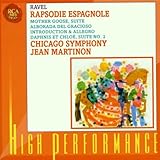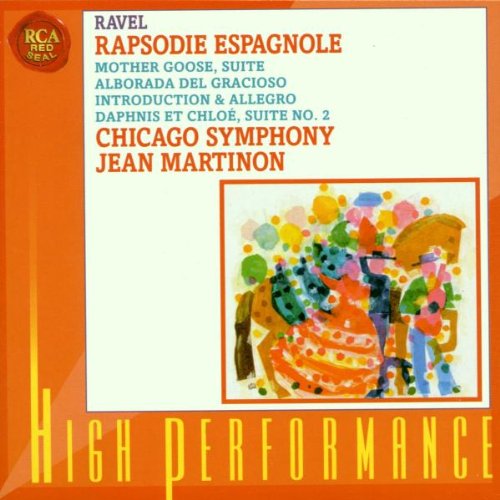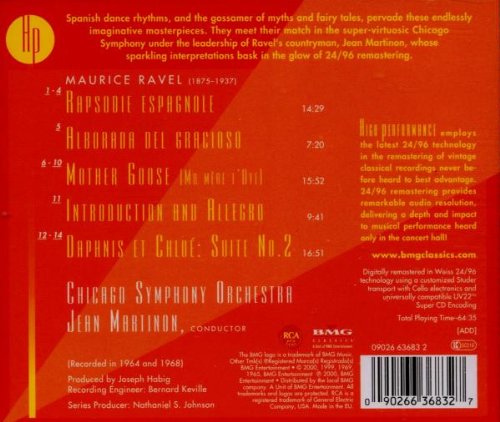Disco de Maurice Ravel: «Ravel: Rapsodie Espagnole; Daphnis et Chloe; Suite No. 2»

- Valoración de usuarios: (4.7 de 5)
- Título:Ravel: Rapsodie Espagnole; Daphnis et Chloe; Suite No. 2
- Fecha de publicación:2000-06-06
- Tipo:Audio CD
- Sello discográfico:RCA Red Seal
- UPC:090266368327
- 1Rapsodie Espagnole: Prelude a la Nuit
- 2 Rapsodie Espagnole: Malaguenaimg 2:00
- 3 Rapsodie Espagnole: Habaneraimg 3:02
- 4Rapsodie Espagnole: Feria
- 5 Alborada del graciosoimg 10:00
- 6Mother Goose: Pavane Of The Sleeping Beauty
- 7Mother Goose: Hop-O'-My Thumb
- 8Mother Goose: Laideronnette, Empress Of The Pagodas
- 9Mother Goose: Beauty And The Beast Converse
- 10Mother Goose: The Fairy Garden
- 11Introduction And Allegro For Harp, Flute, Clarinet And Strings
- 12Daphnis et Chloe: Suite No.2: Lever du jour
- 13Daphnis et Chloe: Suite No.2: Pantomime
- 14Daphnis et Chloe: Suite No.2: Danse generale
For years I used to amaze friends with a cheap little used RCA Victrola - one of those hopelessly flexible records you could bend in several different directions at once that came out at the very nadir of domestic record production. The record: Martinon leading the Chicago Symphony in Ravel. Reiner fans who stood by their man in his earlier RCA run through of the "Rhapsodie Espagnole" were shaken to the core when they heard this version. "My Goodness!" I remember one devout Reiner believer softy exclaiming.
Well, now, or at least, back in the millenium year 2000, RCA reissued these recordings, and we again can hear these same stunning performances of Ravel played by the extraordinary Chicago Symphony Orchestra under Martinon on CD. And what a CD! For some inexplicable amd wonderful reason, perhaps for no other reason than because they could, some one at RCA decided they would make a few classical CDs so good they would blow anything else on the CD front out of the water. Whether or not you agree with the quality of many of the performances chosen for this series, labeled "High Performance", the sonic results are rather astonishing. When coupled with superb playing the results are nirvana.
And never more so than in these to-die-for Martinon readings of Ravel. I heard Martinon several times, and frankly he could be rather boring if the orchestra lacked any particular special quality. In San Francisco his Roussel and Ravel disappointed. However, in Chicago, well, there things were very much 'a horse of a different color'. In person leading the Chicago Symphony Orchestra he was far more exciting than he'd sounded at the War Memiorial Opera House with the San Francisco Symphony. In Chicago he could galvanize an audience with his intensity. To get some idea of just what sort of experience this was try locating Martinon leading the Chicago in Nielsen's Symphony #4
The Ravel selections here, made at the time Martinon was leading the Chicago, produce a power and urgency which, when combined with a perfection of playing, is only equalled by Reiner's previous recordings with same orchestra for the same recording company a decade before. (There are several CDs of these Reiner recordings of Ravel - though sadly no Hybrid SACD version yet
and for far too muc money -
When I compared Martinon in "Alborado" as remastered on this CD with an ultra high tech 45rpm record version showcasing the Reiner's famous "Alborado" the result was flabbergasting. I never would have believed you could come so close to what I had always thought was a paragon performance and the ultimate recording medium.
The same happy astonishment takes place when listening to the CD reissue of the "Rhapsodie Espagnole" and the other Ravel selections. Plus the CD offers an extra not found on the Victrola record - Martinon leading the Chicago in Ravel's Daphnis et Chloe Suite No. 2.
Great performances captured in thrilling sensational sound. If you can find one you won't regret it! Should RCA decide to issue this in their fabulous and ever so fairly priced SACD Hybrid series - since apparently it has been discontinued - Oh my goodness!
This CD should be in any collection of fans of the CSO, Ravel, and Jean Martinon. First, this CD has rare and distinctive qualities. It is one of the few CSO recordings available with Jean Martinon as the conductor. The recorded sound of this CD is among the best I have heard of the CSO (after many years of sampling recordings in the CSO store). The "High Performance" designation BMG gave this CD is not a gimmick; the most discerning and critical listener will find the recording quality of the highest category. The "Introduction and Allegro" is a sadly under-performed and under-recorded piece, which I find among the most interesting and alluring pieces ever composed by Ravel. The only regret one will have after listening to this CD is that there were not many more RCA/CSO/Martinon recordings. The rare traits of this CD leave the listener wanting more, thus ensuring that the listener will reach for this CD over and over again as a favorite. Collectors with many recordings of these works needn't hesitate.
Enough reviewers have already extolled the virtues of this extraordinary disc, recorded in two locations in Chicago between 1964 and 1968, so I won't go on. This is, for some mysterious reason, a sonic miracle, the disc you should take along with you when buying new hi-fi equipment. The 24 bit, "High Performance" remastering has enhanced what was already spectacularly full, clear, detailed sound; you have a front row seat when you listen to this disc and every orchestral detail emerges without any sense of artificial enhancement or boosting. Martinon is of course wholly at home with this music and he has an orchestra of remarkable virtuosity. The playing here has everything: sensuousness, refinement, luminosity, charm - the conductor, who knew Ravel, infuses his music with the complex urbanity and soul of the man. He achieves a perfect fusion between Gallic lucidity and Iberian passion; only Reiner and Munch with the Boston Symphony Orchestra rival him.
If I have any criticism, it is that allowing a full string orchestra to accompany the "Introduction and Allegro" rather gilds the lily but the recording balance doesn't allow them to swamp the solo instruments and the harpist is especially.
Sadly, this is a comparatively rare partnership and all the more reason for treasuring this most recommendable of introductions to Ravel's orchestral music. Martinon was at the helm of the Chicago for only five years and made comparatively few recordings with them. If you need convincing try the lucent, rippling transparency of his opening to "Daphnis et Chloé" - Ravel's sound world has never before been so luxuriantly realised.
Jean Martinon's tenure at Chicago was made difficult by the pathological efforts of the Chicago Tribune's art critic Claudia Cassidy. Martinon was by no means her only victim; she made life hard for Rafael Kubelik and Fritz Reiner, too. Martinon's repertoire was more adventurous than predecessor Reiner's had been (perhaps that was Cassidy's problem; maybe she only wanted to hear Easy Listening crap) and his performances belied the blindsides by "Acidy Cassidy."
Here, though, Martinon is with his familiar French repertoire (he had come from the Paris Conservatory Orchestra), and a splendid job of it he does! These are interpretations by a master at the baton and an orchestra that was at its peak, arguably the best in America at the time. Highly recommended if you can find a copy (it is out of print)
There's a lot wrong here: Martinon, before the wrong orchestra. So, why do I like it? Probably because Martinon didn't take the first thing that came to him and did some work to turning the orientation of these performances toward Paris. It makes a lot of difference. And it's wonderful listening.
But, unlike the previous reviewer, I think this is rather a well-done compromise and can't really fulfill the French performance paradigms that Martinon sought. The EMI recordings with the Orchestre de Paris show the conductor uncovering a lot of color, elan, and that ascerbic, Gallic nastiness that's essential to Ravel and totally, and I mean totally, lacking in this issue. However, it's the best that any French conductor has recorded in Chicago.
But that's the key word: recorded. I have a sneaking suspicion that the storied concerts by Paul Paray may have gone some way beyond this, and his recordings on Mercury with the Detroit Symphony carefully trained in the French style give you spades more in color, character, drama, and rive gauche than you'll ever get a whiff of here.
Buy this, but as supplemental listening to Martinon's Paris work, and file all of that just behind your Paray editions.


